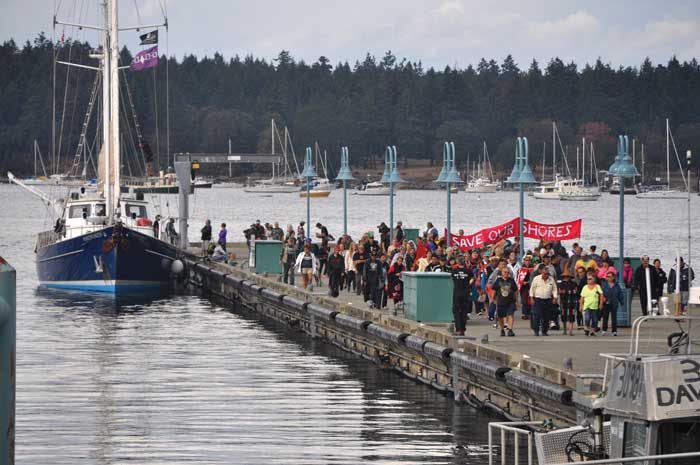Is it just another fish tale?
By Cara McKenna
Momentum is building to act over what BC Indigenous leaders say has been decades of Canada ignoring fishing rights, even after the “sunny ways” promises of last year’s federal election. In several cases, those rights were even reaffirmed by court decisions, but continue to be overlooked years later. Some chiefs are saying “enough is enough” and that they will soon be forced to assert their own Indigenous laws and jurisdiction.
On Oct. 19, Nuu-cha-nulth leaders from Vancouver Island’s west coast gathered at Musqueam First Nation to announce that nothing has changed seven years after the nations won, in B.C. Supreme Court, the right to catch and sell all species of fish.
It’s also why they asked a high-ranking Department of Fisheries and Oceans official to leave their territory during ongoing negotiations on Sept. 23.
Musqueam Chief Wayne Sparrow said his nation is facing the same problem more than two decades after the Supreme Court of Canada ruled in 1990 in the precedent-setting Sparrow case that Aboriginal fishing rights take priority over all others.
“We have the exact same concern at Musqueam,” the Musqueam chief said of the Nuu-cha-nulth announcement.
The fight extends to nations who have not yet taken their concerns to court. Communities across BC have had to fight for access to salmon and other fish, because priority is given to commercial fishers over Indigenous ones; and wild salmon stocks are at record-low numbers.
Other valuable fish are also being limited. There is the high-value geoduck for which Stz’uminus First Nation has been fighting to get fair access for years.
And the situation is the same in the Northern Interior too, said First Nations Summit Grand Chief Ed John, whose community of Tl’azt’en Nation sits on the banks of Stuart Lake.
“There has been a significant gap in implementing the rights that have been determined in so many court cases across this country,” John said.
Assembly of First Nations National Chief Perry Bellegarde vowed during the Musqueam press conference to help and support communities battling the DFO.
“The former [Harper] government spent $106 million fighting Aboriginal rights,” he said. “Let’s not make the same mistake twice.”
But Grand Chief Stewart Phillip of the Union of B.C. Indian Chiefs said it is “bitterly disappointing” to still be fighting with the Canadian government after many expected things to be different under Prime Minister Justin Trudeau.
He said it’s now up to Indigenous communities to stand up for their own laws.
“We’re going to be asserting our own jurisdiction because obviously we can’t be relying on the honour of the Crown or the courts,” he said. “All of us Indigenous peoples will come together in unprecedented solidarity and support. I predict this will be the future under the Trudeau government.”
The act of nations banding together has already begun. In late August, Snuneymuxw, Stz’uminus and Snaw-naw-as leaders stood with hereditary chiefs from Musgamagw Dzawada’enuxw as they protested in Nanaimo against the DFO’s failure to consent First Nations over fish farms in their territories.
At the time, Stz’uminus elder and fisherman Ray Harris voiced his concerns about the DFO’s policies.
“We’re the same as you,” he said. “We’re concerned about all the resources in the sea.”




